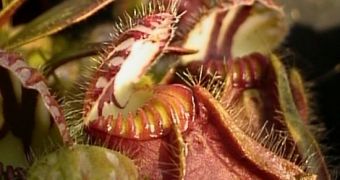Over the past few years, biologists noted a very worrying trend in the evolution of carnivorous, or meat-eating plants. They learned that, overall, the total number and size of populations appeared to be decreasing, and sought to investigate possible reasons why. Recently, a team of scientists from the United Kingdom managed to identify one of the possible causes for this occurrence. The researchers say that contaminants carried into the plant by the prey they consume play an important role in this.
The British investigators say that many of the insects consumed by the various carnivorous plants out there today are laden with dangerous chemicals. They add that the most harmful effects are caused by heavy metals, which are apparently able to stifle the growth process in the plant. The investigation was conducted by a team of experts at the Bournemouth University (BU), and their conclusions appear in the latest issue of the American Chemical Society journal Environmental Science & Technology.
The paper, entitled “Assimilation of Cd and Cu by the Carnivorous Plant Sarracenia leucophylla Raf. Fed Contaminated Prey,” was authored by Dr Iain Green and Christopher Moody, who are both based at the BU Center for Conservation Ecology and Environmental Change. In the experiments the group conducted, the scientists looked at how various concentrations of heavy metals contained in insects affected the plants' ability to grow and develop, AlphaGalileo reports.
One of the more heavily-analyzed metals was cadmium, which is a toxic compound that can be found in metal coatings, fertilizers, as well as a host of other chemical products. In the research, plants of the endangered species Sarracenia leucophylla (white-topped pitcher plants) were fed with house fly maggots that had previously been contaminated with the heavy metal. Analysis of the vegetation then revealed large accumulations of the chemical inside the plant stem. The researchers say that this prevented the proper intake of water and nutrients from the soil, effectively starving the plant.
Carnivorous plants are already endangered by poaching, habitat loss and pollution, and the new research identifies yet another factor that could promote their disappearance. The BU team says that contaminated insects are being discovered very often, due to the fact that they tend to travel above highly-industrialized and polluted areas. Researchers say that improper waste disposal is the main reasons why heavy metals make their way in nature.

 14 DAY TRIAL //
14 DAY TRIAL //